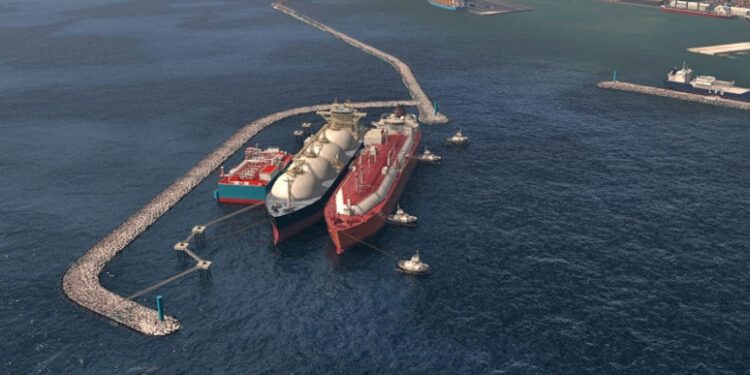Fitch Solutions bearish on Ghana’s LNG re-export plans
Research arm of Fitch Ratings, Fitch Solutions, has asserted that Ghana is contemplating on its ambitious plan to re-export Liquified Natural Gas (LNG) throughout the Sub-Saharan Africa region.
According to Fitch Solutions, it remains bearish on plans by the Ghana National Petroleum Corporation (GNPC) to re-export imported LNG across SSA given the costly infrastructure needed to be constructed across the region.
“Ghana’s re-export project will require a substantial amount of new infrastructure to be constructed across the SSA region which is both costly and requires a substantial amount of time to build,” the research agency stated in its assessment report on the Tema LNG import Terminal.
Adding that, any potential to re-export LNG volumes will remain small on both a regional and global scale due to Ghana’s own need for domestic LNG as well as the constrained demand for gas in the SSA region.
Read details of Fitch Solutions’ assessment:
Plans are consideration by the Ghana National Petroleum Corporation to re-sell LNG throughout the Sub-Saharan Africa region, however, we remain bearish on these re-export plans due to the costly infrastructure needed to be constructed across the region. According to an interview featured in Bloomberg in January 2022 with the manager of GNPC Hamis Ussif, the company plans to re-export LNG in order to position Ghana as an energy hub for the region. Under the plans, GNPC will buy LNG from the Tema facility and then transport it throughout SSA via pipelines, barges and trucks.
While we forecast rising demand for gas across SSA over the long term, there remains a widespread lack of gas import, transport and storage infrastructure across the region. Indeed, Ghana and Cote D’Ivoire are the only two countries expected to be net importers of LNG during our 10-year forecast period to 2031. Other markets across SSA either meet gas demand through their own domestic supply, or simply lack the necessary infrastructure for importing gas, meaning SSA’s gas demand will remain constrained until this dynamic can be shifted through new investment across the region.
Consequently, Ghana’s re-export project will require a substantial amount of new infrastructure to be constructed across the SSA region, which is both costly and requires a substantial amount of time to build.
Benin was cited in the interview as a market that has already shown interest in buying LNG from Ghana, in order to increase its gas supply. However, Benin has been struggling for several years to get proposed plans to build an LNG import terminal off the ground, thus currently lacks the infrastructure to import any LNG. TotalEnergies signed an agreement in 2019 to develop a floating, storage and regasification unit (FSRU) in the country.
The agreement covered imports from 2021, at 0.5mtpa for 15 years, to supply a new 127MW power station. However as of January 2022, the government has yet to fully commit to the project, which casts major doubts on its progression and consequently, on the viability of Ghana re-exporting its LNG to Benin anytime soon.
We expect that any potential re-export volumes will remain small, on both a regional and global scale, due to Ghana’s own need for domestic LNG as well as the constrained demand for gas in the SSA region. One option for re-exporting LNG is through the delivery of LNG via trucks. Land-locked Burkina Faso has been targeted as a potential market that could see the delivery of LNG from Ghana via trucks coming inland. In November 2021, Ecowgas, which is an affiliate of TLTC, was awarded a contract to build LNG storage and regasification facilities in Burkina Faso.
The company already holds exclusive rights to build and operate storage and regasification facilities in Liberia and Sierra Leone. These markets seek to expand their gas supply in order to serve the power sector, which are otherwise dependent on other forms of energy, such as solar or oil-fired power. However, given the nascent (to non-existent) gas economies present in these markets, any demand for Ghana’s LNG that materialises over the near-to-medium term will likely be of very small volumes.
Furthermore, Ghana still requires gas for its own domestic use, which will limit the amount of LNG available for re-export across the region. We forecast a robust uptick in Ghana’s natural gas consumption over our 10-year forecast period to 2031, averaging 5.9% y-o-y to reach 5.88bcm from an estimated 3.3bcm in 2021. This will be driven by strong demand from the power sector, which accounts for the vast majority of the country’s gas consumption.
Historically, Ghana has imported all of its gas via the West African Gas Pipeline (WAGP) from Nigeria, however, pipeline imports have proved volatile and the availability of gas has been falling over recent years, partly due to increased domestic demand for gas from Nigeria as well as issues with the Volta River Authority – Ghana’s purchaser – meeting payments. Pipeline imports have a cost advantage over its LNG counterparts, however, the Tema LNG facility can provide Ghana with a reliable supply of gas that is not dependent on feedstock constraints in Nigeria and the WAGP. Indeed, contracted supply from Shell’s global LNG portfolio means that the risk of supply disruption to the terminal is very low, which marks a significant advantage for Ghana’s future energy security.
Demand Rapidly Outpacing Domestic Supply
Ghana – Gas Production & Consumption Forecast (2020-2031)

e/f = Fitch Solutions estimate/forecast. Source: Ghana Energy Commission, Fitch Solutions








